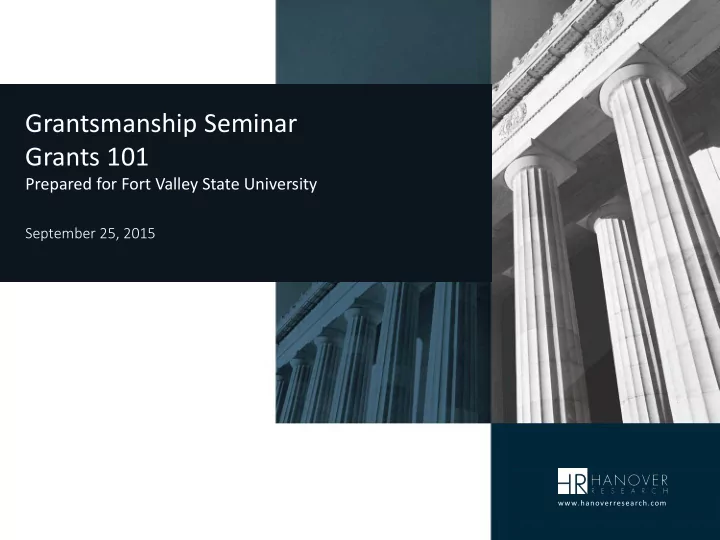

Grantsmanship Seminar Grants 101 Prepared for Fort Valley State University September 25, 2015 www.hanoverresearch.com
AGENDA Grants 101 Grant Writing 101 Budgets Q&A 2
GRANTS 101 Who makes grants? Why do they make grants? What are RFPs, RFAs, and program announcements? How do I decide whether or not to apply? 3
WHO MAKES GRANTS? Federal agencies State and local government agencies National, regional, local, family, community, and corporate foundations Professional or industry associations Businesses and companies 4
WHY DO THEY MAKE GRANTS? Local / Regional / National / Global Need Promote Change & Improvement Philanthropic Investment Preferred Tax Status Public Recognition In summary, they are attempting to address priorities they have identified or their own goals and interests. 5
Prospecting - Basic Vocabulary Grant versus gift Solicitation (RFP, RFR, FOA, BAA, PA, RFQ, etc.) Solicited vs. Non-solicited Types of Awards Grant Cooperative Agreement Renewable vs. Non-renewable Contract Subcontract 7
Where to Look for Opportunities Grants.gov Federal Agency Website Professional Associations Acknowledgements in relevant papers, reports, presentations Ask – collaborators, conference presenters Institutional Grant Offices and libraries National websites of large industries or retailers in your state/region Subscription Services Grant opportunity databases (COS PIVOT, InfoED; Foundation Center, etc. 8
Tips for Searching Create a research agenda profile that includes search terms and limiters Look for eliminators first (eligibility, deadlines, etc.) Be proactive – search for possibilities and keep a calendar of times when they are usually due. Discuss potential for subcontracts with colleagues who are funded and/or applying (Grants beget grants!) Collaborate – divide and conquer! 9
RFPs, RFAs & PROGRAM ANNOUNCEMENTS Requests for Proposals Requests for Applications Program Announcements Solicitations These documents set the parameters for grant competitions. 10
RFPs, RFAs & PROGRAM ANNOUNCEMENTS Key Elements Eligibility Type of Awardee Geographic Limitations Funding Amount Project Period Program Goals / Metrics Submission Instructions Budget Stipulations Additional Resources Grant manuals Application packages Links to online submission tools Links to previous awards databases References cited Points of contact 11
Interactive Demonstration Search Grants.gov Example of Program Solicitation: NSF IUSE Application Package: READ THE INSTRUCTIONS!!!
SHOULD I APPLY? Am I eligible? Do I have or can I conceive of a project that fits the parameters? Do I have the bandwidth to develop a proposal under the deadline and implement the project? Can I address all the required elements or bring in partners who can fill blanks? Would I be excited to execute the grant if I got the funding? Might the grant serve as a stepping stone to bigger/better grants in the future? 13
GRANT WRITING 101 How do I write a competitive proposal? What are SMART outcomes and objectives? What goes in my Budget and Budget Narrative? What other tips and suggestions may help? 14
FIRST STEPS Review all instructions and deadlines Review applicant criteria to ensure eligibility Identify the grantmaker’s central goal(s) Clarify submission process and method Develop… Checklist of all required proposal elements Timeline for proposal development Narrative Outline based on the scoring rubric or key section headings (may include character-, word-, or page-limits) 15
WRITING THE NARRATIVE Imagine that you already have the grant money Describe precisely how the money will be spent Who What When Where Why Every sentence should relate to your project Third-person future is preferred (“FVSU will…”) Show alignment with grantmaker goal(s) Articulate the impact of the project concretely Details, details, details!! 16
S.M.A.R.T. FRAMEWORK 17
GRANT BUDGETS Typical Budget lines include: Personnel Fringe Benefits (standard rates) Travel Equipment (durable, long-lasting) Supplies (expendable, short-term) Contractual Construction Indirect Costs (note limitations) Other Provide as much clarity as space/format allows: Opaque: Program Director: $75,000 Transparent: Program Director: 50% FTE @ $50,000/yr x 3 yrs = $75,000 18
GRANT BUDGET NARRATIVE AKA “Budget Justification” Show a clear method of calculation for each item Link each item back to grant activities and the grantmaker goal(s) 19
Opaque Transparent The University will subcontract with a The University will contract with an program evaluation company. independent professional evaluation Funding is requested at $25,000. service to conduct a rigorous program evaluation to verify impact and results as outlined in the Evaluation plan (Narrative page 15). This cost is estimated at an hourly rate of $100 and includes 200 hours of work plus $5,000 in travel costs associated with two site visits during the grant term. Total requested: $25,000. 20
TIPS & SUGGESTIONS Write the Abstract/Executive Summary last Build the Budget as you go Less is not more Repetition can help to emphasize keys points Start grant submission process early Don’t be shy of talking with Program Officers Consider your audience and the review process 21
QUESTIONS 22
Jacklyn Sutcivni Grants Consultant Jackie’s career as a grant writer spans a broad range of disciplines. Since 2000, she has helped institutions of higher education, healthcare agencies, not-for-profit organizations, and governmental entities obtain more than $50 million in grant funding. A former research assistant, healthcare professional, public administrator, staff grant writer for higher education, and small business owner, Jackie brings a range of skills and experience to every engagement. Specializing in federal grant submissions, her expertise in federal grant program design, implementation, and management are immediately evident. She is especially skilled in advancing initiatives through the development of multi-partner and consortium grant proposals and balancing faculty and administrative perspectives. 23
CONTACT William Kay Content Director wkay@hanoverresearch.com www.hanoverresearch.com
Recommend
More recommend